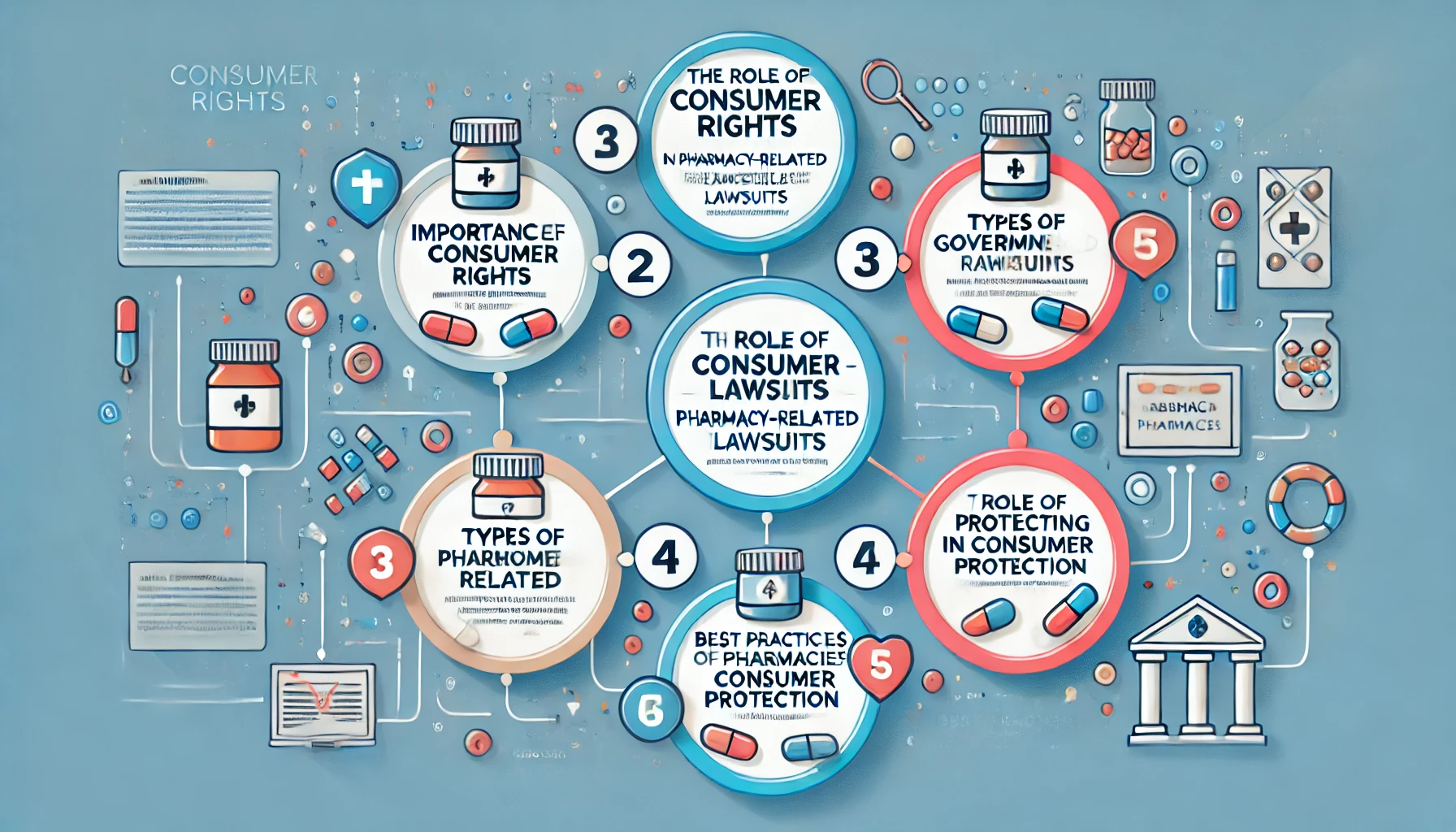The Medly Pharmacy Lawsuit has brought significant attention to the practices and responsibilities of pharmacy providers in patient care. This case raises questions about the accountability of pharmacy companies when it comes to regulatory compliance and the safety of the services they provide.
In recent years, legal actions against pharmacies like Medly have underscored the importance of following strict guidelines. The Medly Pharmacy Lawsuit specifically highlights issues that could impact patient trust and industry practices, as well as how pharmacies manage patient information and medication distribution.
As the Medly Pharmacy Lawsuit progresses, stakeholders from the healthcare and legal sectors are closely watching its developments. The case’s outcome may influence future regulatory standards, potentially shaping how pharmacy operations are conducted to ensure public health and safety.
Medly Pharmacy Lawsuit: Overview of the Case and Allegations
The Medly Pharmacy Lawsuit centers around alleged issues related to patient safety and pharmacy compliance. The case has raised questions about the handling of prescriptions and the protection of consumer health information.
Initial allegations indicate that Medly Pharmacy may have breached regulatory practices, leading to concerns over the safe and accurate dispensing of medications. This has prompted a closer look at Medly’s operational procedures, especially regarding prescription verification.
- Key Allegations:
- Mismanagement of prescriptions
- Failure to adhere to standard pharmacy protocols
- Potential impact on patient safety due to procedural lapses
Legal filings from the case highlight a range of complaints from patients and healthcare providers, underscoring the urgency for stricter oversight within the pharmacy industry. Observers speculate that this lawsuit could become a precedent-setting case in pharmacy accountability.
In response to the Medly Pharmacy Lawsuit, industry professionals are discussing necessary reforms, especially in areas like electronic health records management and medication tracking. The lawsuit’s progress will likely influence broader discussions on pharmacy safety standards.
Regulatory Standards and Their Role in Pharmacy Lawsuits
Pharmacies, including Medly, are required to follow specific regulatory standards, ensuring patient safety and adherence to proper medication management practices. These standards are established by agencies like the FDA and DEA to prevent risks associated with medication dispensing errors.
Regulations govern various aspects, including how prescriptions are filled, patient information is stored, and medications are dispensed. In cases like the Medly Pharmacy Lawsuit, alleged breaches of these standards have led to legal challenges that could reshape the regulatory landscape.
One aspect under scrutiny is the role of pharmacy audits and the checks in place for ensuring compliance. A table below highlights some critical regulations impacting pharmacy operations:
| Regulation | Description | Governing Body |
| DEA Control | Limits on controlled substance distribution | DEA |
| FDA Labeling | Ensures proper labeling for safety | FDA |
| HIPAA | Protects patient health information | HHS |
The Medly Pharmacy Lawsuit may prompt a review of these standards, particularly in pharmacy accountability mechanisms. It could lead to strengthened auditing practices, mandatory reporting of non-compliance, and increased penalties for breaches.
As the case unfolds, stakeholders anticipate that it may inform future legislation, aiming to bolster consumer protection in the pharmacy sector. These regulatory shifts could raise the bar for operational procedures across the industry.
Key Legal Arguments in the Medly Pharmacy Lawsuit
The legal arguments in the Medly Pharmacy Lawsuit are based on claims of negligence, breach of duty, and patient endangerment. Plaintiffs allege that Medly Pharmacy failed to meet basic standards in prescription management, which could lead to patient harm.
A key focus is on whether Medly Pharmacy adequately trained its staff in handling prescriptions and securing patient information. Legal counsel for the plaintiffs has argued that these failures highlight systemic issues within the pharmacy’s operations.
Arguments also center around the pharmacy’s responsibility to maintain up-to-date patient records and prescription logs. In the lawsuit, plaintiffs suggest that failure to do so may have led to medication errors.
Another dimension of the case explores how Medly Pharmacy’s policies and procedures compared with industry standards. This argument suggests that Medly’s alleged lapses may not only have compromised safety but also violated standard regulatory protocols.
With various stakeholders presenting evidence, the Medly Pharmacy Lawsuit is poised to offer insights into the pharmacy sector’s obligations, potentially affecting policies on training, record-keeping, and quality control.
How the Medly Pharmacy Lawsuit Could Impact Industry Practices
The Medly Pharmacy Lawsuit could have significant ramifications for pharmacy practices, especially in compliance and patient care. This case may influence how pharmacies are required to handle prescription verification and staff training.
If the lawsuit results in stricter regulations, pharmacies might have to adopt more rigorous protocols, particularly concerning prescription checks and data security. For example, pharmacies may face more frequent audits and stricter penalties for non-compliance.
- Potential Changes Post-Lawsuit:
- Enhanced training requirements for pharmacy staff
- Increased emphasis on record-keeping and compliance documentation
- Stricter penalties for mishandling patient data
The lawsuit could also drive innovations in pharmacy technology, with an emphasis on reducing human error in prescription processing. Many anticipate an increased role for automation in reducing risks associated with medication handling.
Ultimately, the Medly Pharmacy Lawsuit may act as a catalyst for broader reforms within the pharmacy sector, establishing new standards that ensure patient safety and operational accountability across the industry.
The Role of Consumer Rights in Pharmacy-Related Lawsuits

Consumer rights play a critical role in pharmacy-related lawsuits, as they empower individuals to hold pharmacies accountable for service standards. Patients expect safe and accurate dispensing of medications, which forms a foundational consumer right within healthcare.
Consumer protection laws allow patients to take legal action if they feel that pharmacy negligence has compromised their safety. In the Medly Pharmacy Lawsuit, plaintiffs are invoking these rights to address alleged breaches in service and safety standards.
Some key consumer rights that influence these lawsuits include the right to accurate information, safe medication handling, and protection of personal health data. Such rights are often cited in cases where patients experience harm due to medication errors.
- Essential Consumer Rights:
- Right to safe, verified medication
- Access to accurate health information
- Protection against negligent practices
As the case progresses, the Medly Pharmacy Lawsuit may set a precedent for consumer rights in pharmacy cases, especially in enforcing transparency and accountability within the sector. This case could lead to enhanced awareness of patients’ legal rights in healthcare services.
Understanding the Legal Responsibilities of Pharmacies
Pharmacies have numerous legal responsibilities, including ensuring safe dispensing, adhering to federal regulations, and protecting patient information. These responsibilities are legally binding and intended to prevent errors that could harm patient health.
At the core of pharmacy responsibilities is accurate prescription filling. Errors in this process can lead to serious health consequences, which is why the law holds pharmacies accountable for thorough verification procedures. In the Medly Pharmacy Lawsuit, alleged lapses in these responsibilities are under legal examination.
A further legal responsibility is the safeguarding of patient health information under HIPAA. Failing to comply with these regulations exposes pharmacies to lawsuits and penalties, as patient data privacy is a central aspect of healthcare law.
The table below provides a quick look at some major legal obligations for pharmacies:
| Responsibility | Description | Governing Law |
| Accurate Dispensing | Ensures patient receives correct dosage | State/Federal |
| Data Privacy | Protects patient health information | HIPAA |
| Staff Training | Requires competent, trained personnel | Pharmacy Board |
The Medly Pharmacy Lawsuit may serve as a case study, underscoring the significance of these legal responsibilities and how failure to meet them can lead to serious legal consequences.
What Precedents Could Influence the Medly Pharmacy Case?
The Medly Pharmacy Lawsuit is not occurring in isolation; various legal precedents could shape its proceedings and outcome. Previous lawsuits involving pharmacy negligence have set standards that influence how courts view pharmacy responsibilities and patient safety.
One notable precedent includes cases where pharmacies were held liable for failing to verify prescription accuracy, resulting in patient harm. Such cases highlight the court’s stance on the necessity of careful and accurate medication handling.
Cases involving data privacy breaches have also shaped pharmacy-related legal standards. Given the role of HIPAA, any mishandling of patient information could subject pharmacies to significant legal scrutiny, as seen in past lawsuits.
The influence of these precedents may provide insight into the Medly Pharmacy Lawsuit as well, with courts likely considering similar past judgments when evaluating Medly’s actions and potential liabilities. These precedents reinforce the importance of adhering to safety standards and legal obligations within the pharmacy sector.
Potential Financial Impacts of Pharmacy Lawsuits

Pharmacy lawsuits, like the Medly Pharmacy Lawsuit, can lead to significant financial repercussions for the businesses involved. Legal costs, settlements, and potential penalties often create substantial financial strain on the pharmacy.
Lawsuits involving pharmacies frequently result in compensatory damages to affected patients, which can run into millions of dollars, depending on the extent of harm. These damages cover expenses such as medical bills, lost wages, and pain and suffering, which impose direct costs on pharmacies.
- Common Financial Outcomes:
- Settlement costs and compensatory damages
- Increased insurance premiums
- Reputational damage impacting revenue
A lawsuit’s financial impact can also extend beyond direct costs, affecting a pharmacy’s reputation and causing potential revenue loss. Negative publicity can deter customers, leading to long-term financial impacts.
In cases like Medly’s, the outcome could prompt pharmacies to invest more in compliance measures to avoid future legal challenges. Enhanced regulatory compliance and staff training, while costly, may ultimately serve as a proactive financial strategy to mitigate lawsuit risks.
Medly Pharmacy Lawsuit: Implications for Patient Safety
The Medly Pharmacy Lawsuit raises critical questions about patient safety, particularly regarding the accuracy of prescription handling and medication dispensing practices. When pharmacies fail to follow stringent protocols, patients may face serious health risks.
One of the main concerns involves the potential for medication errors, which can lead to adverse health effects if a patient receives the wrong dosage or medication. The lawsuit underscores the importance of precision in pharmacy operations to prevent such risks.
Ensuring patient safety also requires pharmacies to secure patient information, as improper handling can compromise privacy. This aspect of the Medly Pharmacy Lawsuit highlights the broader risks tied to data breaches in healthcare.
In response to these concerns, the pharmacy industry may see an increase in safety protocols to enhance patient protection. Many experts believe that this case could prompt new patient-centered safety regulations.
- Key Safety Considerations Highlighted:
- Accurate medication handling
- Proper storage of health information
- Adherence to dispensing protocols
The Role of Medical Professionals in Supporting Pharmacy Claims

Medical professionals play a crucial role in supporting pharmacy claims, providing essential insights into proper medication handling and patient care standards. In cases like the Medly Pharmacy Lawsuit, expert opinions help clarify the pharmacy’s responsibilities.
Physicians and pharmacists often testify to establish the expected standard of care in dispensing medications. Their input can reveal whether Medly’s practices aligned with these standards or fell short, impacting the case’s outcome.
Moreover, medical professionals help in reviewing prescription accuracy and the effects of medication errors on patient health, which are central to the claims against Medly. Their evaluations can support or refute allegations of negligence.
Medical professionals also assess the pharmacy’s operational procedures, determining if these practices adequately safeguard patient safety. Their perspectives shape the court’s understanding of what constitutes acceptable care in pharmacy services.
Overall, the involvement of medical experts in the Medly Pharmacy Lawsuit may reinforce the need for robust pharmacy protocols, with an emphasis on minimizing risks to patient health and ensuring strict adherence to industry standards.
How Lawsuits Affect the Reputation and Operations of Pharmacies
Pharmacy lawsuits, such as the Medly Pharmacy Lawsuit, can significantly impact a pharmacy’s reputation, affecting consumer trust and operational viability. A pharmacy’s reputation often relies on its perceived reliability, which lawsuits can severely damage.
Negative publicity from lawsuits can lead to a loss of customer confidence, as consumers may question the pharmacy’s ability to provide safe and effective care. This, in turn, can lead to decreased sales and customer retention issues.
Operations are often disrupted as pharmacies must allocate resources toward legal defenses, affecting day-to-day functions. Staff training, compliance audits, and system overhauls may become necessary to address lawsuit findings and prevent future incidents.
- Operational Impacts:
- Increased training and compliance costs
- Implementation of safety and quality checks
- Possible decline in customer retention
For Medly, the lawsuit’s impact on its reputation could extend long term, prompting the company to take corrective actions to restore public trust. These operational changes may require sustained efforts to meet industry and consumer expectations.
Navigating Legal Options as a Pharmacy Customer
Pharmacy customers have several legal options if they experience harm or believe their rights have been compromised. The Medly Pharmacy Lawsuit highlights the potential for customers to seek recourse through the legal system.
Affected customers can file complaints with regulatory bodies, such as the state’s pharmacy board or the FDA. This step can initiate an investigation into the pharmacy’s practices, ensuring accountability and potential compensation.
Another option is to join or initiate a lawsuit, as some customers may be able to file a class-action suit if they have experienced similar issues. This path can provide a collective platform to address widespread concerns with pharmacy operations.
- Options for Customers:
- Filing complaints with state or federal agencies
- Exploring class-action or individual lawsuit options
- Consulting with legal professionals for case evaluation
For those impacted by the Medly Pharmacy Lawsuit, understanding these options is crucial to ensuring their rights are protected. Legal support may be necessary to navigate these choices and determine the best course of action for redress.
Medly Pharmacy Lawsuit: Possible Outcomes and Future Considerations
The Medly Pharmacy Lawsuit could result in several possible outcomes, each carrying implications for Medly and the broader pharmacy sector. One potential result is a financial settlement, where Medly compensates affected parties.
If the lawsuit reaches a verdict, Medly could face penalties or operational mandates, requiring changes to its procedures. This may involve implementing stricter protocols and enhancing oversight to prevent future incidents.
Future considerations for the industry include the possibility of regulatory reforms, prompted by the lawsuit’s findings. These reforms could enforce higher standards, especially in prescription accuracy and data security.
The lawsuit might also encourage pharmacies to invest more heavily in compliance and staff training. Preventative measures could become a focus, as pharmacies aim to avoid similar legal challenges.
In the broader context, the Medly Pharmacy Lawsuit may set a benchmark, influencing how pharmacies operate and prioritize patient safety in response to legal scrutiny.
Conclusion
The Medly Pharmacy Lawsuit underscores the importance of accountability within the pharmacy industry, with a focus on safeguarding patient health and adhering to regulatory standards. This case highlights the potential risks associated with medication errors and data mismanagement, issues that can significantly impact patient trust and well-being.
As the lawsuit progresses, it could prompt pharmacies nationwide to reevaluate their protocols, especially regarding prescription accuracy and patient information protection. Strengthening these aspects could not only prevent legal repercussions but also enhance the overall quality of care provided by pharmacies.
Furthermore, this case may set a precedent for future legal actions against pharmacies, influencing how courts view cases involving pharmacy negligence and consumer rights. The Medly Pharmacy Lawsuit could ultimately serve as a catalyst for positive change, emphasizing the critical role of patient safety in pharmacy operations and encouraging stricter industry standards.

